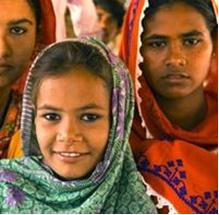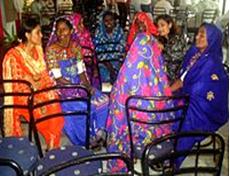The status of women in Pakistan varies considerably across classes, regions, and the rural/urban divide due to uneven socio-economic development and the impact of tribal, feudal and capitalist social formation on women's lives. The Pakistani women of today enjoy a better status than most Muslim women.
| WOMEN IN PAKISTAN |
The status of women in Pakistan varies considerably across classes, regions, and the rural/urban divide due to uneven socio-economic development and the impact of tribal, feudal and capitalist social formation on women's lives. The Pakistani women of today enjoy a better status than most Muslim women. However, on an average, the women's situation, vis-à-vis men, is one of systemic, although there have been attempts by the government and enlightened groups to elevate the status of women in Pakistani society. Now due to lots of awareness among people, the educational opportunities for the Pakistani women have increased. However, Pakistani women still face atrocities like rape, acid throwing, honor killings, forced marriages, forced prostitution and the buying and selling of women. The past few years have been witness to a steep increase in such crimes.
History
Historically, in the 19th century, feminist-sympathetic movements within the South Asian Muslim community tried to counter social evils against Muslim women through the custom of purdah (where women were forcibly isolated from social contact, primarily with men). Other Muslim reformers such as Syed Ahmad Khan tried to bring education to women, limit polygamy, and empower women in other ways through education.
It is pointed out that Muslim women leaders from all classes actively supported the Pakistan movement in the mid-1940s. Their movement was led by wives and other relatives of leading politicians. Women were sometimes organised into large-scale public demonstrations. Before 1947 there was a tendency for the Muslim women in Punjab to vote for the Muslim League while their menfolk supported the Unionist Party.
Pakistani women were granted the suffrage in 1947 under the Pakistan (Creation of Pakistan) Ordinance, and they were reaffirmed the right to vote in national elections in 1956 under the interim Constitution. The provision of reservation of seats for women in the Parliament existed throughout the constitutional history of Pakistan from 1956 to 1973.
Culture
Although women's dress varies depending on region, class and occasion, shalwar kameez is the principal garment worn by Pakistani women. Ghararas (a loose divided skirt worn with a blouse) and lehengas were very common earlier, but now they are worn mostly at weddings.
Few Pakistani women wear the hijab or burqa in public and the degree to which they choose to cover, varies. Some Pakistani women, who do not wear the hijab, may wear the dupatta or chadar instead.
A Sari is a formal dress worn on special occasions by some urban women. The so-called "Islamization" under General Zia ul Haq's dictatorship branded the sari as an "un-Islamic" form of dress. The sari is now making a comeback in fashionable circles. Western garments such as T-shirts and Jeans are common amongst young urban women.
Education
Despite the improvement in Pakistan's literacy rate since its Independence, the educational status of Pakistani women is among the lowest in the world. The literacy rate for urban women is more than five times the rate for rural women. The school drop-out rate among girls is very high (almost 50 percent). The educational achievements of female students are higher as compared with male students at different levels of education, a redeeming factor. This is the story of a few years ago but now education in Pakistan for women is improving rapidly. In the city of Lahore there are a total of 46 public colleges out of which 26 are female colleges and if we talk about the rest of 20 colleges some of them offer co-education. Similarly the public universities of Pakistan have more female enrolment than that of boys.
Dress code
Hijab and Hijab by country

Tribal women wearing Shalwar Kameez outfits, living in Burban, Pakistan.
AURAT FOUNDATION
Aurat Foundation has its Head Office in Islamabad, and four regional offices in the provincial capitals (Lahore, Karachi, Peshawar and Quetta). AF is a civil society organisation working for women’s empowerment and citizens’ rights with the collaboration of citizens’ groups and organisations to provide information, build capacity and undertake advocacy for women’s issues and for good governance in Pakistan.
The goals of the Foundation are to:
- assist women to acquire greater control over knowledge, resources and institutions
- influence social attitudes and behaviour for a sensitive and responsive social environment to address women’s concerns and development
- develop a strong network of civil society organisations to support women at the community and district level
- undertake advocacy with public servants and public representatives for development policies and planning as well as supportive legislation that increases women’s access to development opportunities and resources.
Website: http://www.af.org.pk/mainpage.htm
Sr. Josephine Emmanuel
Pakistan

